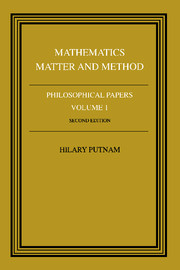Book contents
- Frontmatter
- Contents
- Dedication
- Introduction
- 1 Truth and necessity in mathematics
- 2 The thesis that mathematics is logic
- 3 Mathematics without foundations
- 4 What is mathematical truth?
- 5 Philosophy of physics
- 6 An examination of Grünbaum's philosophy of geometry
- 7 A philosopher looks at quantum mechanics
- 8 Discussion: comments on comments on comments: a reply to Margenau and Wigner
- 9 Three-valued logic
- 10 The logic of quantum mechanics
- 11 Time and physical geometry
- 12 Memo on ‘conventionalism’
- 13 What theories are not
- 14 Craig's theorem
- 15 It ain't necessarily so
- 16 The ‘corroboration’ of theories
- 17 ‘Degree of confirmation’ and inductive logic
- 18 Probability and confirmation
- 19 On properties
- 20 Philosophy of Logic
- Bibliography
- Index
1 - Truth and necessity in mathematics
Published online by Cambridge University Press: 04 August 2010
- Frontmatter
- Contents
- Dedication
- Introduction
- 1 Truth and necessity in mathematics
- 2 The thesis that mathematics is logic
- 3 Mathematics without foundations
- 4 What is mathematical truth?
- 5 Philosophy of physics
- 6 An examination of Grünbaum's philosophy of geometry
- 7 A philosopher looks at quantum mechanics
- 8 Discussion: comments on comments on comments: a reply to Margenau and Wigner
- 9 Three-valued logic
- 10 The logic of quantum mechanics
- 11 Time and physical geometry
- 12 Memo on ‘conventionalism’
- 13 What theories are not
- 14 Craig's theorem
- 15 It ain't necessarily so
- 16 The ‘corroboration’ of theories
- 17 ‘Degree of confirmation’ and inductive logic
- 18 Probability and confirmation
- 19 On properties
- 20 Philosophy of Logic
- Bibliography
- Index
Summary
I hope that no one will think that there is no connection between the philosophy of the formal sciences and the philosophy of the empirical sciences. The philosophy that had such a great influence upon the empirical sciences in the last thirty years, the so-called ‘logical empiricism’ of Carnap and his school, was based upon two main principles:
(1) That the traditional questions of philosophy are so-called ‘pseudoquestions’ (Scheinprobleme), i.e. that they are wholly senseless; and
(2) That the theorems of the formal sciences – logic and mathematics – are analytic, not exactly in the Kantian sense, but in the sense that they ‘say nothing’, and only express our linguistic rules.
Today analytical philosophers are beginning to construct a new philosophy of science, one that also wishes to be unmetaphysical, but that cannot accept the main principles of ‘logical empiricism’. The confrontation with the positivistic conception of mathematics is thus no purely technical matter, but has the greatest importance for the whole conception of philosophy of science.
What distinguishes statements which are true for mathematical reasons, or statements whose falsity is mathematically impossible (whether in the vocabulary of ‘pure’ mathematics, or not), or statements which are mathematically necessary, from other truths? Contrary to a good deal of received opinion, I propose to argue that the answer is not ‘ontology’, not vocabulary, indeed nothing ‘linguistic’ in any reasonable sense of linguistic.
Information
- Type
- Chapter
- Information
- Mathematics, Matter and MethodPhilosophical Papers, pp. 1 - 11Publisher: Cambridge University PressPrint publication year: 1979
